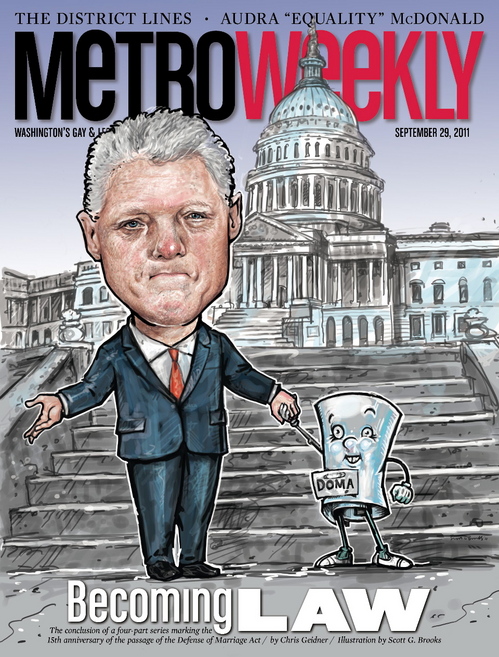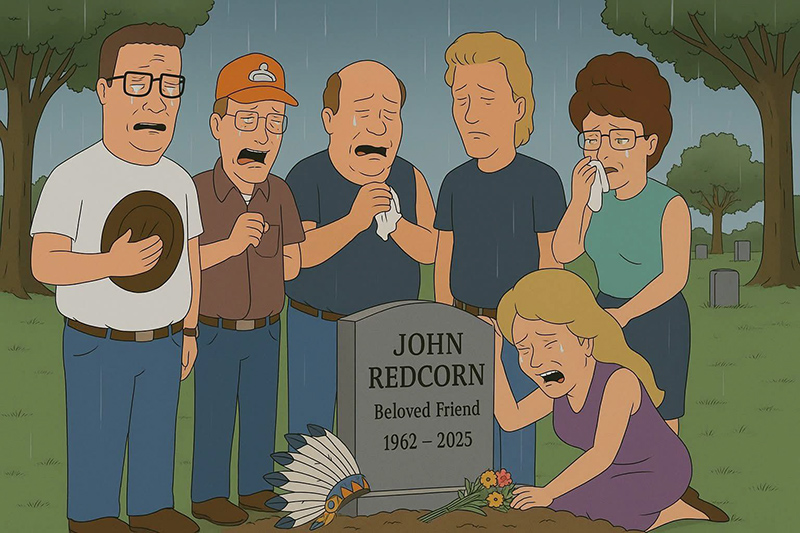DOMA Is “Becoming Law” in This Week’s Metro Weekly
This week’s article — “Becoming Law” — will be is the conclusion of a four-part series marking the 15th anniversary of the passage of the Defense of Marriage Act. The aim of the series is to present an in-depth examination of the circumstances, consideration and passage of the 1996 federal marriage law.
Here’s a preview:
[On] Sept. 20, 1996, the bill passed by both chambers of Congress was sent to the White House and “presented” to the president.
At that point, [President] Clinton had 10 days to sign the bill.
The White House Press Office released a statement from the president, in which he said, “Throughout my life I have strenuously opposed discrimination of any kind, including discrimination against gay and lesbian Americans.”
Then: “I am signing into law H.R. 3396, a bill relating to same-gender marriage, but it is important to note what this legislation does and does not do. I have long opposed governmental recognition of same-gender marriages and this legislation is consistent with that position.
“This legislation … has no effect on any current federal, state or local anti-discrimination law and does not constrain the right of Congress or any state or locality to enact anti-discrimination laws.”
Clinton’s statement closed: “I also want to make clear to all that the enactment of this legislation should not, despite the fierce and at times divisive rhetoric surrounding it, be understood to provide an excuse for discrimination, violence or intimidation against any person on the basis of sexual orientation. Discrimination, violence and intimidation for that reason, as well as others, violate the principle of equal protection under the law and have no place in American society.” …
At 12:50 a.m., Sept. 21, 1996, in the early hours of a Saturday, the president signed the Defense of Marriage Act into law.
Read the full story in this week’s Metro Weekly for more about why Clinton signed the bill; what, and how much, LGBT organizations did to stop him from doing so; and what the Clinton re-election campaign did in the fall of 1996 that almost led to a very public post-signing breakdown with LGBT activists and campaign staff.
Here are the earlier articles in the series:
Part 1: Domestic Disturbance
Before DOMA, there was another debate over marriage – within the gay and lesbian community
Part 2: Marriage Wars
In 1996, DOMA went from being introduced to being passed by the House – and given the OK of the Clinton administration – in less than 10 weeks
Part 3: Double Defeat
In 1996, ENDA was hoped to help ease the pain of DOMA, but instead fell by one vote in a Senate focused on a ”thinly disguised example of intolerance”
Support Metro Weekly’s Journalism
These are challenging times for news organizations. And yet it’s crucial we stay active and provide vital resources and information to both our local readers and the world. So won’t you please take a moment and consider supporting Metro Weekly with a membership? For as little as $5 a month, you can help ensure Metro Weekly magazine and MetroWeekly.com remain free, viable resources as we provide the best, most diverse, culturally-resonant LGBTQ coverage in both the D.C. region and around the world. Memberships come with exclusive perks and discounts, your own personal digital delivery of each week’s magazine (and an archive), access to our Member's Lounge when it launches this fall, and exclusive members-only items like Metro Weekly Membership Mugs and Tote Bags! Check out all our membership levels here and please join us today!

































